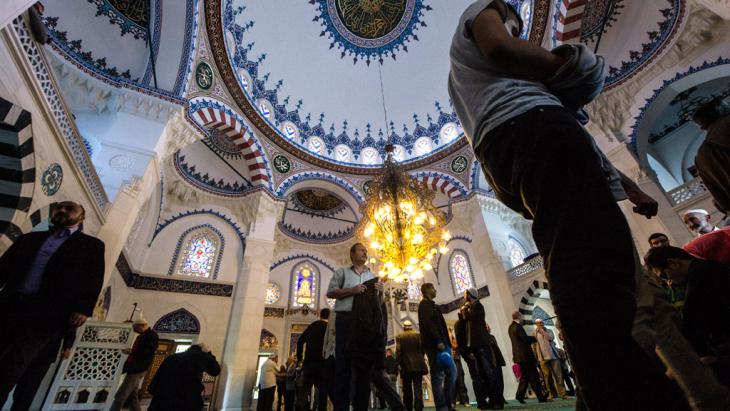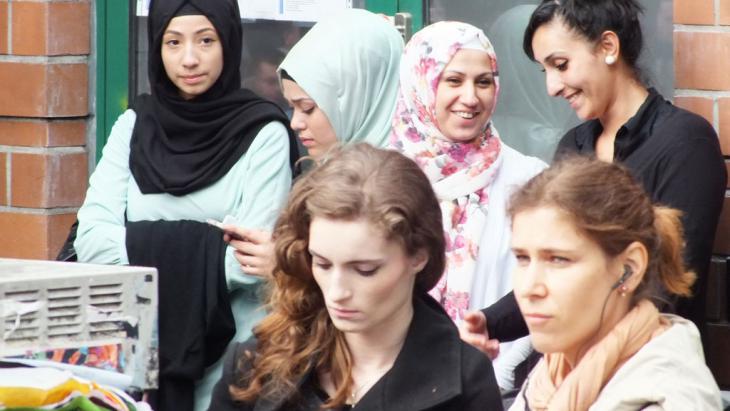Blocked integration

The Islamic Sehitlik community in the Berlin district of Neukölln had intended to take a stand against homophobia and transphobia within the Muslim community. The idea was that gays, lesbians and transsexuals would visit their mosque and enter into a dialogue with worshippers there. This highly symbolic meeting in the mosque had been scheduled to take place over a week ago, but the event was cancelled – officially "postponed" – due to political pressure from Turkey.
For racists seeking swift recognition as "critics of Islam" in worlds both real and virtual, this was all they needed. Following the cancellation of the queer–Muslim dialogue event, the Internet bristled with comments and mass-distribution e-mails along the lines of: "There's nothing more to add, everything's been said. Don't forget: this mosque is regarded as VERY liberal."
While they remained silent when the dialogue meeting was first announced, the authors of such reactionary comments now claim that this is yet more evidence that "Muslims don't fit into our system of values". This is tantamount to saying "all Muslims are homophobic", of course, which is why German Islamophobes are now suddenly developing a sense of solidarity with gays, lesbians and transsexuals.
But what does the Turkish state have to do with a mosque in Berlin?
The Sehitlik Mosque is part of the Turkish Islamic Union for Religious Affairs (DITIB), which in accordance with a German-Turkish treaty is dependent on Turkey's official Presidency of Religious Affairs in Ankara. Without the cash from Turkey, the Sehitlik Mosques and other mosques would not exist.
A lack of privileges
The so-called "critics of Islam" frequently accuse mosque communities in Germany of exclusively representing the interests and customs of the worshippers' countries of origin. The perpetual claim is that the communities are neither independent, nor capable of integration. But what these "critics" consciously disregard is the fact that the communities are forced by the German state to rely on the financial support of other countries.

Christians and Jews in Germany pay religious taxes (Kirchensteuer and Kultussteuer respectively); Muslims do not have this privilege. The Catholic Church in Germany has an annual income of some €5.5 billion from this tax alone: for Muslim congregations, which are just a fifth of the size, this means that they lack over €1 billion that could be invested in dialogue projects such as the one planned by the Sehitlik Mosque – a billion euros that would mean independence from governments in Ankara, Riyadh and Rabat.
But this tax privilege isn't the only thing that Muslims have to do without. State discrimination in Germany also takes on other forms.
State discrimination
Although theoretically we live in a secular state, only church bells are allowed to ring out; the muezzin is not even permitted to issue a call to prayer on Fridays or public holidays.
Muslim burials without a coffin are prohibited in all but a handful of federal states. The mandatory use of coffins dates from the seventeenth century, when it was introduced as a way of preventing the burial of a person who only appeared to be dead, by storing the body in a coffin for 48 hours.
Muslims are not represented on the majority of broadcasting councils, although they also pay fees for public-service broadcasting.
Exclusion from the religious tax system means these mosques are dependent on the agendas of other governments. The state's non-recognition of Muslim communities and their needs prevents the integration of Muslims in Germany in particular.
The case of the cancelled event against homophobia at the Sehitlik Mosque is not evidence of the "backwardness of Islam", as many are now saying in online forums. It is solely an illustration of the fact that conditions in Germany are such that Muslims cannot be a self-determined and equal part of our society.
The five million Muslims who live in this country will only become full, integrated citizens when state and society permit it. In this sense, there are also "integration deficits" in majority society. As long as majority society does not make a change, we are leaving it to governments in Turkey and Saudi Arabia to decide whether, for example, gays, lesbians and transsexuals are welcome in a mosque.
Armin Langer
© Qantara.de 2014
Translated from the German by Nina Coon
Armin Langer is the co-ordinator of the Salaam-Schalom Initiative in the Berlin district of Neukölln.
